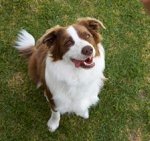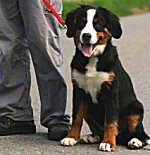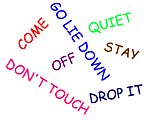Dogue de Bordeaux: What's Good About 'Em, What's Bad About 'Em
Dogue de Bordeaux temperament, personality, training, behavior, pros and cons, advice, and information, by Michele Welton, Dog Trainer, Behavioral Consultant, Author of 15 Dog Books

The Dogue de Bordeaux, aka French Mastiff, is quiet, calm, and relaxed – until aroused. Don't be lulled by his bulk. He can be surprisingly athletic and agile when necessary.
This is not an apartment dog. To stay fit, he needs some space and moderate daily exercise. But more than anything else, he requires personal interaction.
Picture that massive body trying to settle itself onto your lap and an enormous tongue swiping across your face. Dogues love to be an integral part of your family.
Dogue de Bordeaux puppies should be friendly and trusting, and with proper socialization become reserved and discriminating as they mature. As with all mastiffs, socialization is an absolute requirement to avoid either aggression or shyness.
Animal aggression can be a problem; most Dogues will not start fights, but they will surely finish them.
This stubborn breed is inclined to do things his own way, but he will respond to early, consistent training that includes firm leadership, cheerful praise, and food rewards.
The Dogue de Bordeaux has an astonishing talent for snoring, sliming, and drooling. Slobber towels should be high on your list of canine accessories.
If you want a dog who...
- Is massive and powerful
- Has a sleek easy-care coat
- Is calm and quiet indoors (as an adult)
- Needs only moderate exercise
- Makes an imposing watchdog, being serious and self-assured with strangers, yet generally mild-mannered unless aroused
A Dogue de Bordeaux may be right for you.
If you don't want to deal with...
- A huge dog who takes up a lot of space in your house and car
- A heavy dog who wants to sit on your feet and lean against your leg
- Rowdiness and exuberant jumping when young
- Destructiveness when bored or left alone too much
- Aggression or fearfulness toward people in some lines, or when not socialized enough
- Aggression toward other animals
- Strong-willed mind of his own, requiring a confident owner who can take charge
- Snuffling, wheezing, grunting, loud snoring
- Slobbering and drooling
- Gassiness (flatulence)
- Serious health problems and a short lifespan
- Legal liabilities (public perception, future breed bans, insurance problems, increased chance of lawsuits)
A Dogue de Bordeaux may not be right for you.
 |
Dog Breed Traits – Which Traits Are Right For You? In this brand new series, I'll help you decide which dog breed traits would best suit you and your family, your home and yard, and your lifestyle, so you can choose the best dog breed for your family. |
Keep in mind that the inheritance of temperament is less predictable than the inheritance of physical traits such as size or shedding. Temperament and behavior are also shaped by raising and training.
FREE eBooks by Michele Welton
![]() "Respect Training for Puppies" and "Teach Your Dog 100 English Words" are free step by step guides to teaching your pup to be calm and well-behaved.
"Respect Training for Puppies" and "Teach Your Dog 100 English Words" are free step by step guides to teaching your pup to be calm and well-behaved.
![]() "11 Things You Must Do Right To Keep Your Dog Healthy and Happy" is a free guide to keeping your dog mentally, physically, and emotionally happy and healthy so you can enjoy a longer lifetime of companionship.
"11 Things You Must Do Right To Keep Your Dog Healthy and Happy" is a free guide to keeping your dog mentally, physically, and emotionally happy and healthy so you can enjoy a longer lifetime of companionship.

More traits and characteristics of the Dogue de Bordeaux
If I was considering a Dogue de Bordeaux, I would be most concerned about...
- Providing the proper balance of exercise. Young Dogues need enough exercise to keep them lean and healthy, but not so much that their soft growing bones, joints, and ligaments become over-stressed and damaged. Adult Dogues need more exercise to keep them in shape, but not in hot or humid weather for fear of overheating. The proper amount of exercise can be difficult to regulate in giant breeds.
And since you have to minimize their exercise, young Dogues de Bordeaux can be rambunctious, romping with uncoordinated gawkiness all over your house. You need to substitute extra quantities of companionship and supervision – otherwise, left alone, young Dogues de Bordeaux become bored and destructive, and their powerful jaws can literally destroy your living room. - Providing enough socialization. Most Dogues have protective instincts toward strangers. They need extensive exposure to friendly people so they learn to recognize the normal behaviors of "good guys." Then they can recognize the difference when someone acts abnormally. Without careful socialization, they may be suspicious of everyone, which could lead to aggression. Some Dogues go in the opposite direction – without enough socialization, they become fearful of strangers.
- Potential animal aggression. Many Dogues de Bordeaux will not tolerate another dog of the same sex, and some won't tolerate the opposite sex either. Some Dogues have strong instincts to chase and seize cats and other fleeing creatures. If anything goes wrong in the breeding, socializing, training, handling, or management of this breed, it is capable of seriously injuring or killing other animals.
- The strong temperament. Dogues de Bordeaux have an independent mind of their own and are not pushovers to raise and train. Some Dogues are willful, obstinate, and dominant (they want to be the boss) and will make you prove that you can make them do things. You must show them, through absolute consistency, that you mean what you say.
To teach your mastiff to listen to you, "Respect Training" is mandatory. Read my free online training programs.
- Dogue de Bordeaux "sounds". The Dogue de Bordeaux grunts and snuffles, and snores loudly. The sounds are endearing to some people; nerve-wracking to others.
- Slobbering. Most people are not prepared for how much the Dogue de Bordeaux slobbers and drools, especially after eating or drinking. When they shake their heads, you will be toweling saliva and slime off your clothes and furniture.
- Gassiness (flatulence). All short-faced breeds gulp air when they eat, and that air has to go somewhere, after all. However, commercial diets make flatulence worse by including fibrous or hard-to-digest ingredients. Dogues who are fed a heavily meat-based diet have much less trouble with gassiness.
- Serious health problems. The lifespan of a Dogue de Bordeaux is short and an alarming number are crippled by bone and joint diseases and/or succumb to cancer in middle age. To keep this breed healthy, I recommend following all of the advice on my Dogue de Bordeaux Health Page.
- Legal liabilities. The Dogue de Bordeaux may be targeted for "banning" in certain areas, or refusal of homeowner insurance policies. Your friends and neighbors may be uncomfortable around this breed. In this day and age, the legal liabilities of owning any breed that looks intimidating and has a history as a guard dog should be seriously considered. People are quicker to sue if such a dog does anything even remotely questionable.
Frankly, the Dogue de Bordeaux is "too much dog" for the average household. This is a massive dog with tremendous strength. Very few people really have the knowledge or skills necessary to manage this breed properly.
My best-selling books – now available FREE on my website
 Respect Training For Puppies: 30 seconds to a calm, polite, well-behaved puppy is for puppies 2 to 18 months old. Your puppy will learn the 21 skills that all family dogs need to know. Click here to read for free.
Respect Training For Puppies: 30 seconds to a calm, polite, well-behaved puppy is for puppies 2 to 18 months old. Your puppy will learn the 21 skills that all family dogs need to know. Click here to read for free. Teach Your Dog 100 English Words is a unique Vocabulary and Respect Training Program that will teach your adult dog to listen to you and do what you say. Click here to read for free.
Teach Your Dog 100 English Words is a unique Vocabulary and Respect Training Program that will teach your adult dog to listen to you and do what you say. Click here to read for free. 11 Things You Must Do Right To Keep Your Dog Healthy and Happy helps your dog live a longer, healthier life. Get my honest advice about all 11 Things before you bring home your new puppy, because some mistakes with early health care cannot be undone. Click here to read for free.
11 Things You Must Do Right To Keep Your Dog Healthy and Happy helps your dog live a longer, healthier life. Get my honest advice about all 11 Things before you bring home your new puppy, because some mistakes with early health care cannot be undone. Click here to read for free.Related posts you might enjoy






